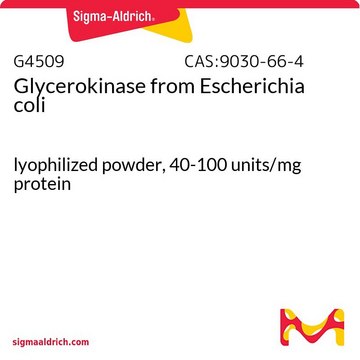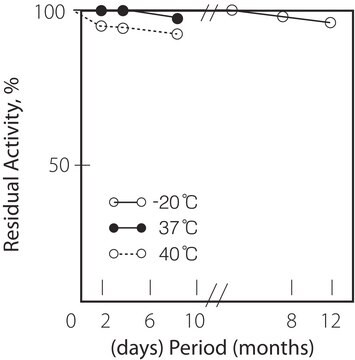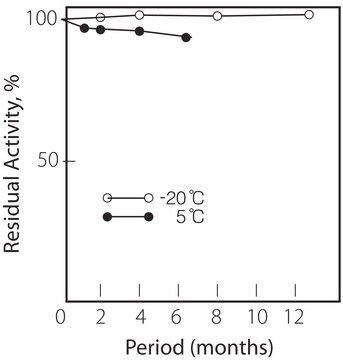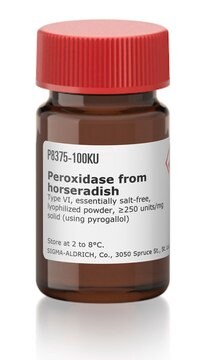G0774
Glycerokinase from Bacillus stearothermophilus
buffered aqueous solution, ≥75 units/mg protein (biuret)
Synonym(s):
ATP:glycerol 3-phosphotransferase, Glycerol Kinase
Sign Into View Organizational & Contract Pricing
All Photos(1)
About This Item
Recommended Products
biological source
Bacillus sp. (Bacillus steaarothermophilus)
Quality Level
Assay
≥5.0 mg protein/mL (biuret)
form
buffered aqueous solution
specific activity
≥75 units/mg protein (biuret)
storage condition
dry at room temperature
color
beige
application(s)
life science and biopharma
storage temp.
2-8°C
Gene Information
Bacillus sp. ... glpK(89613566)
Looking for similar products? Visit Product Comparison Guide
General description
Research area: Cell Signaling
Glycerol kinase is encoded by the GK gene on chromosome Xp21.2. Glycerol kinase is predominantly active in the liver.
Glycerol kinase is encoded by the GK gene on chromosome Xp21.2. Glycerol kinase is predominantly active in the liver.
Application
Glycerokinase from Bacillus stearothermophilus has been used in steady-state kinetics studies.
Biochem/physiol Actions
Glycerol kinase catalyzes tge MgATP-dependent phosphorylation of glycerol to produce sn-glycerol-3-phosphate and is the rate limiting enzyme in the utilization of glycerol. It is also subject to feedback regulation by fructose-1,6-bisphosphate.Oxidized glycerol-3-phosphate results in dihydroxyacetone phosphate which enters either glycolysis or gluconeogenesis. Elevated glycerol is observed in glycerol kinase deficiency leading to pseudohypertriglyceridemia.
Unit Definition
One unit will convert 1.0 μmole of glycerol and ATP to L-α-glycerophosphate and ADP per min at pH 9.8 at 25 °C in a coupled system with PK/LDH.
Physical form
Stabilized solution in Tris buffer, pH 7.3
Signal Word
Danger
Hazard Statements
Precautionary Statements
Hazard Classifications
Resp. Sens. 1
Storage Class Code
11 - Combustible Solids
WGK
WGK 3
Flash Point(F)
Not applicable
Flash Point(C)
Not applicable
Personal Protective Equipment
dust mask type N95 (US), Eyeshields, Gloves
Choose from one of the most recent versions:
Already Own This Product?
Find documentation for the products that you have recently purchased in the Document Library.
Purification and properties of glycerol kinase from Escherichia coli.
S I Hayashi et al.
The Journal of biological chemistry, 242(5), 1030-1035 (1967-03-10)
N Zwaig et al.
Journal of bacteriology, 102(3), 753-759 (1970-06-01)
The activity of glycerol kinase is rate-limiting in the metabolism of glycerol by cells of Escherichia coli. A mutant strain producing a glycerol kinase resistant to inhibition by fructose-1,6-diphosphate grows faster than its wild-type parent on glycerol as the sole
Ioanna Gouni-Berthold et al.
The British journal of nutrition, 107(11), 1694-1706 (2011-10-15)
Animal and human studies suggest that a malleable protein matrix (MPM) from whey decreases plasma lipid concentrations and may positively influence other components of the metabolic syndrome such as glucose metabolism and blood pressure (BP). The primary objective of this
Daria V Cherkashina et al.
Rejuvenation research, 14(6), 661-667 (2011-10-20)
Abstract Effects of stem and progenitor cells or their compounds on recipient cells are investigated intensively today. In spite of this, their ability to interact with native cells and the final targets affected by them, particularly biochemical parameters that characterize
Laurence Portois et al.
International journal of molecular medicine, 29(6), 1121-1126 (2012-03-20)
Second generation n3-PUFA-depleted rats represent a good animal model of metabolic syndrome as they display several features of the disease such as liver steatosis, visceral obesity and insulin resistance. The goal of our study was to investigate the influence of
Our team of scientists has experience in all areas of research including Life Science, Material Science, Chemical Synthesis, Chromatography, Analytical and many others.
Contact Technical Service









